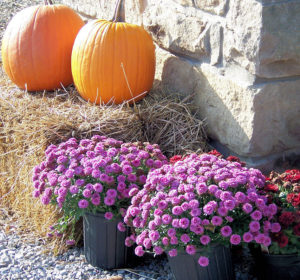
All garbage, mostly great for the garden. Image via Shari Weinsheimer, with no copyright, using this CC: https://creativecommons.org/publicdomain/zero/1.0/
Autumn’s garbage provides a wealth of opportunities for next year’s garden. Not just leaves, but pumpkins and potted plants, too. (But leave the straw bale.)
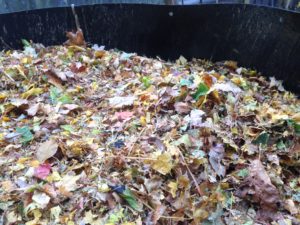
Leaves, glorious leaves. Free mulch, nutrients and carbon-rich compost material, conveniently bagged and easily accessible in your neighborhood!
Leaves are, of course, the most obvious beneficial garbage. I prefer to shred them first, so they not only decompose faster, but they don’t blow around the yard, and they look better. Shredded leaves from my and neighbor’s yards get put to use:
- As carbon-rich material in the compost.
- Covering garden beds where it moderates temperature fluctuations, holds the top soil in place, provides food for worms (who do great work in the soil all winter), and adds nutrients as they decompose. In the spring they easily rake off.
- Walking paths/rows are covered in leaves, making sure weeds don’t grow.
- Flower gardens and raspberry patches are covered in shredded leaves to keep them moister and to keep the weeds at bay.
You can shred with a power mower or a leaf shredder. I’ve got an inexpensive Worx model that does decently well, especially if the leaves are dry and there are no sticks in the mix. If I ever win the lottery, I’ll buy myself a $1000 Patriot 14 amp electric chipper/shredder.
Note: Inevitably someone will be upset if I don’t point out a few things: Oak leaves break down slowly due to high lignin levels, but once they break down, they are not acidic. Try to avoid leaves from yards that are treated with herbicides/pesticides. Fresh Black Walnut leaves contain juglone (toxic to other plants), but fall leaves seem to have little if any. We all good now? Excellent.
Pumpkins are plentiful and free for the taking after Halloween. They provide great nitrogen-rich material for your compost pile, a great way to get the carbon:nitrogen balance necessary for your compost, especially this time of year when you’ve likely got a lot of leaves.
Each year I put out a sign and a container, asking people to give me your pumpkins, as long as there’s no paint on them. We then invite some friends over and have a smashing pumpkins event for kids and adults to take out their aggression before adding the nitrogen-rich material to the compost.
Note: As of October 2016, there are no GMO pumpkins on the market, if that is a concern of yours.
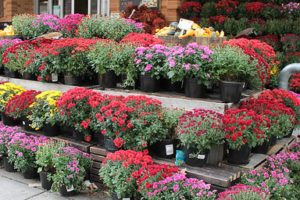
That is a LOT of peat people throw out! Image courtesy of Elvert Barnes, via this CC license https://creativecommons.org/licenses/by-sa/2.0/
Decorative potted plants, most frequently mums, are probably the most overlooked “garbage” item of fall. These are basically containers of peat with some fertilizer mixed in that happen to have some dead flowers in them.
I don’t like buying peat because of depletion and climate change issues, but if these are on their way to the incinerator, I’ll take them.
The material in these pots can be used all sorts of ways, such as:
- Potting up plants,
- Seed starting,
- Simply break it apart by hand it and spread over the lawn,
- Or my preferred option, composting.
Drive around the neighborhood early to mid November into December and you’ll see dozens of these available on garbage day. Take them home and toss the bucket of peat in the compost.
Note: Even if these pots of flowers have been treated with potentially bee-harming neonicotinoid pesticides, studies show they do NOT survive composting. The material is still likely to have a variety of fertilizers in there, so if that is a concern to you, you’d likely want to avoid them unless you can determine provenance.
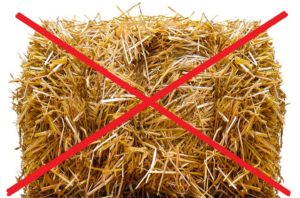
Do NOT collect hay/straw for use in a vegetable garden.
Hay/Straw are also widely available on garbage day. Unfortunately, hay fields
are often treated with broadleaf herbicides in the pyralid family. These persistent herbicides not only survive consumption by animals, they survive the composting process as well, sometimes lasting for three or more years after composting. They’ll kill off all broadleaf plants, including tomatoes, eggplant, peas, and much, much more.
There have been a few widespread issues with this, when industrial compost operations mistakenly included treated material (manure from horses that ate treated hay) as well as many more localized instances where people received treated material.
So unless you know whether that hay/straw was treated, I’d recommend not using it in any compost or vegetable gardens.

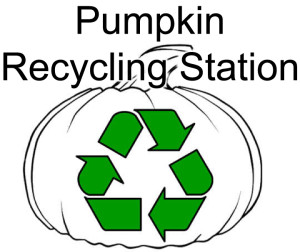
Thanks for this info and yesterday’s (at Lexplore), Jeremy. Now I know why eggshells and bread are not recommended, also rice! Why not dairy products?
thanks,
Judy
Thanks Judy!
Just to be clear, eggshells and bread (and dairy) can be composted, but they can be attractive to unwanted guests. If you’re composting in a guest-resistant container (eg, metal trash can, tumbler, etc.) or you don’t care about potential guests, then no problem.
The issue with dairy products is a bit of the same but also the smell. I don’t fret about small amounts of cheese or yogurt, but placing a big chunk ‘o cheese or a gallon of whey in the compost can lead to some pretty unpleasant smells!